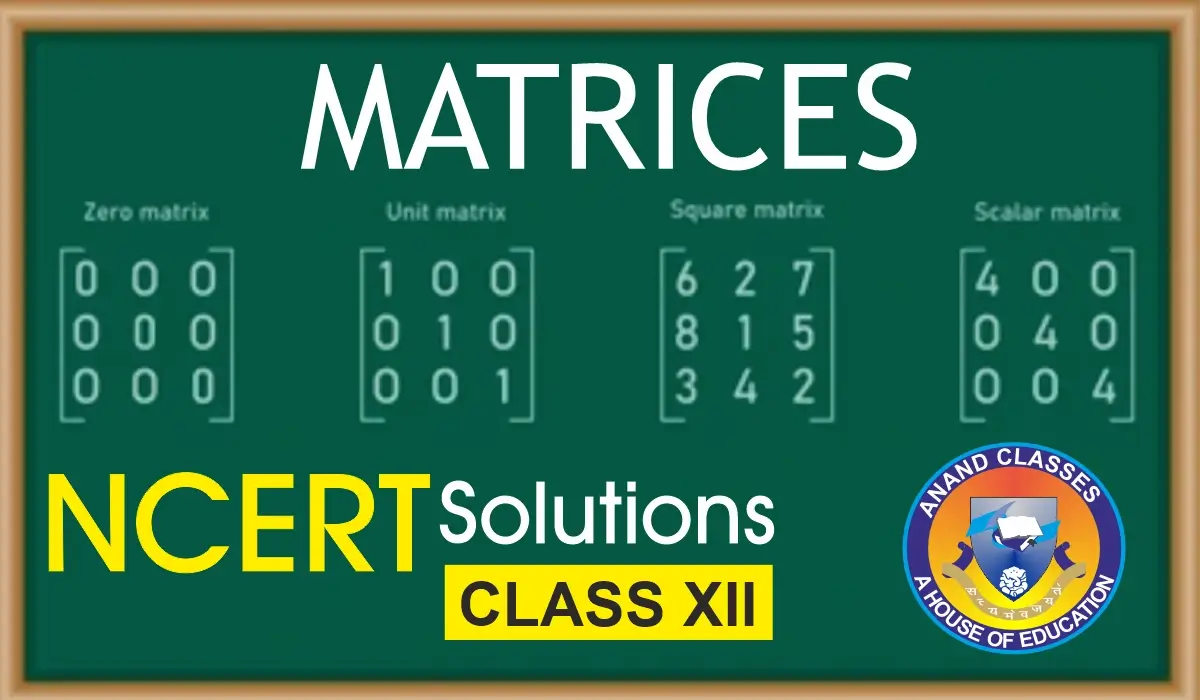Anand Classes is pleased to provide a free downloadable PDF of the NCERT Solutions for Class 12 Maths Chapter 7 – Integrals, Exercise 7.3 (Set-3). This set is thoughtfully crafted to help students master trigonometric-integral problems such as those involving powers of sine and cosine, products like sinA cosB, and repeated products of cosines—topics highlighted in standard solution collections for Exercise 7.3. The detailed, step-by-step solutions adhere strictly to the latest CBSE/NCERT syllabus and are ideal for effective revision and exam readiness. Click the print button to download study material and notes.
NCERT Question 16: Evaluate the Integral
$$\displaystyle \int \tan^4(x)\; dx$$
Solution
Use the identity $\tan^2 x = \sec^2 x – 1$ to write
$$\tan^4 x = (\tan^2 x)^2 = (\sec^2 x – 1)^2 = \sec^4 x – 2\sec^2 x + 1.$$
So
$$\int \tan^4(x)\; dx = \int \sec^4 x\; dx – 2\int \sec^2 x\; dx + \int 1\; dx.$$
Evaluate $\displaystyle\int \sec^4 x\; dx$ by setting $u=\tan x$, $du=\sec^2 x\; dx$:
$$\int \sec^4 x\; dx = \int \sec^2 x(1+\tan^2 x)\; dx $$
$$\int \sec^4 x\; dx = \int (1+u^2)\; du$$
$$\int \sec^4 x\; dx = u + \frac{u^3}{3} + C$$
$$\int \sec^4 x\; dx = \tan x + \frac{1}{3}\tan^3 x + C.$$
Also $\displaystyle\int \sec^2 x\; dx = \tan x$ and $\displaystyle\int 1\; dx = x$.
Therefore
$$
\int \tan^4(x)\; dx
= \Bigl(\tan x + \frac{1}{3}\tan^3 x\Bigr) – 2\tan x + x + C $$
$$\int \tan^4(x)\; dx = x – \tan x + \frac{1}{3}\tan^3 x + C.$$
Final Answer
$$\boxed{\displaystyle \int \tan^4(x)\; dx = x – \tan x + \frac{1}{3}\tan^3 x + C}$$
Download concise solved integrals by Anand Classes — perfect for quick revision for JEE, NEET, and CBSE preparation.
NCERT Question 17: Evaluate the Integral
$$\displaystyle \int \frac{\sin^3(x)+\cos^3(x)}{\sin^2(x)\cos^2(x)}\; dx$$
Solution
$$\displaystyle \int \frac{\sin^3(x)+\cos^3(x)}{\sin^2(x)\cos^2(x)}\; dx$$
Simplify the integrand:
$$\frac{\sin^3 x+\cos^3 x}{\sin^2 x\cos^2 x}
=\frac{\sin^3 x}{\sin^2 x\cos^2 x}+\frac{\cos^3 x}{\sin^2 x\cos^2 x}
=\frac{\sin x}{\cos^2 x}+\frac{\cos x}{\sin^2 x}$$
Rewrite using standard trig functions:
$$\frac{\sin x}{\cos^2 x}=\tan x\sec x,\qquad
\frac{\cos x}{\sin^2 x}=\cot x\csc x$$
So the integral becomes
$$\int\bigl(\tan x\sec x+\cot x\csc x\bigr)\; dx
=\int \sec x\tan x\; dx+\int \cot x\csc x\; dx$$
Use known antiderivatives $\dfrac{d}{dx}(\sec x)=\sec x\tan x$
and $\dfrac{d}{dx}(\csc x)=-\csc x\cot x$:
$$\int \sec x\tan x\; dx=\sec x,\qquad
\int \cot x\csc x\; dx=-\csc x$$
Final Answer
$$\boxed{\displaystyle \int \frac{\sin^3(x)+\cos^3(x)}{\sin^2(x)\cos^2(x)}\; dx = \sec x – \csc x + C}$$
Download concise worked solutions and practice notes by Anand Classes — perfect for JEE, NEET, and CBSE exam preparation.
NCERT Question 18: Evaluate the Integral
$$\displaystyle \int \frac{\cos(2x) + 2\sin^2(x)}{\cos^2(x)}\; dx$$
Solution
$$\displaystyle \int \frac{\cos(2x) + 2\sin^2(x)}{\cos^2(x)}\; dx$$
First, expand the numerator using the identity
$$\cos(2x) = \cos^2(x) – \sin^2(x)$$
So,
$$\cos(2x) + 2\sin^2(x) = \cos^2(x) – \sin^2(x) + 2\sin^2(x) = \cos^2(x) + \sin^2(x) = 1$$
Hence the integrand simplifies to
$$\frac{1}{\cos^2(x)} = \sec^2(x)$$
Now integrate:
$$\int \sec^2(x)\; dx = \tan(x) + C$$
Final Answer
$$\boxed{\displaystyle \int \frac{\cos(2x) + 2\sin^2(x)}{\cos^2(x)}\; dx = \tan(x) + C}$$
Practice more such simplifications and integrals with Anand Classes — your one-stop destination for conceptual clarity and speed in JEE, NEET, and CBSE exams.
NCERT Question 19: Evaluate the Integral
$$\displaystyle \int \frac{1}{\sin x\cos^3 x}\; dx$$
Solution
$$\displaystyle \int \frac{1}{\sin x\cos^3 x}\; dx$$
Note that $\csc x=\dfrac{\sec x}{\tan x}$, so
$$
\frac{1}{\sin x\cos^3 x}=\sec^3 x\csc x=\sec^4 x\cdot\frac{1}{\tan x}.
$$
Using $u=\tan x$ and $du=\sec^2 x\; dx$ we get
$$
\sec^4 x\cdot\frac{1}{\tan x}\; dx
=\frac{\sec^2 x}{\tan x}\cdot\sec^2 x\; dx
=\frac{1+u^2}{u}\; du
=\left(\frac{1}{u}+u\right)\; du.
$$
Integrate:
$$
\int\left(\frac{1}{u}+u\right)\; du
=\ln|u|+\frac{u^2}{2}+C.
$$
Substitute back $u=\tan x$:
$$
\boxed{\displaystyle \int \frac{1}{\sin x\cos^3 x}\; dx
=\ln\bigl|\tan x\bigr|+\frac{1}{2}\tan^2 x + C.}
$$
Download complete worked solutions by Anand Classes — perfect for JEE, NEET and CBSE exam preparation.
NCERT Question 20: Evaluate the Integral
$$\displaystyle \int \frac{\cos(2x)}{\bigl(\cos x+\sin x\bigr)^2}\; dx$$
Solution
$$\displaystyle \int \frac{\cos(2x)}{\bigl(\cos x+\sin x\bigr)^2}\; dx$$
Use the identity
$$\cos(2x)=\cos^2 x-\sin^2 x=(\cos x+\sin x)(\cos x-\sin x).$$
Hence the integrand simplifies:
$$\frac{\cos(2x)}{(\cos x+\sin x)^2}=\frac{(\cos x+\sin x)(\cos x-\sin x)}{(\cos x+\sin x)^2}
=\frac{\cos x-\sin x}{\cos x+\sin x}.$$
Let
$$u=\cos x+\sin x\quad\Rightarrow\quad du=(\cos x-\sin x)\; dx.$$
The integral becomes
$$\int \frac{du}{u}=\ln\bigl|u\bigr|+C.$$
Substituting back $u=\cos x+\sin x$ gives the final result.
Final Answer
$$\boxed{\displaystyle \int \frac{\cos(2x)}{\bigl(\cos x+\sin x\bigr)^2}\; dx = \ln\bigl|\cos x+\sin x\bigr| + C}$$
NCERT Question 21: Evaluate the Integral
$$\displaystyle \int \sin^{-1}(\cos x)\; dx$$
Solution
$$\displaystyle \int \sin^{-1}(\cos x)\; dx$$
Let
$$I=\int \sin^{-1}(\cos x)\; dx.$$
We know that
$$\cos x=\sin\left(\frac{\pi}{2}-x\right),$$
so
$$\sin^{-1}(\cos x)=\sin^{-1}\left[\sin\left(\frac{\pi}{2}-x\right)\right]=\frac{\pi}{2}-x.$$
Therefore,
$$I=\int\left(\frac{\pi}{2}-x\right)\; dx.$$
Integrate termwise:
$$I=\frac{\pi x}{2}-\frac{x^2}{2}+C.$$
Final Answer
$$\boxed{\displaystyle \int \sin^{-1}(\cos x)\; dx=\frac{\pi x}{2}-\frac{x^2}{2}+C}$$
Study concept-based NCERT integration problems with Anand Classes — perfect for JEE, NEET, and CBSE exams.
NCERT Question 22: Evaluate the Integral
$$\displaystyle \int \frac{dx}{\cos(x-a)\cos(x-b)}$$
Solution
$$\displaystyle \int \frac{dx}{\cos(x-a)\cos(x-b)}$$
Use the identity
$$\tan(x-b)-\tan(x-a)=\frac{\sin\bigl((x-b)-(x-a)\bigr)}{\cos(x-a)\cos(x-b)}=\frac{\sin(a-b)}{\cos(x-a)\cos(x-b)}$$
Hence
$$\frac{1}{\cos(x-a)\cos(x-b)}=\frac{\tan(x-b)-\tan(x-a)}{\sin(a-b)}.$$
So
$$\int \frac{dx}{\cos(x-a)\cos(x-b)}=\frac{1}{\sin(a-b)}\int\bigl(\tan(x-b)-\tan(x-a)\bigr)\; dx $$
$$\int \frac{dx}{\cos(x-a)\cos(x-b)}=\frac{1}{\sin(a-b)}\Bigl(-\ln\bigl|\cos(x-b)\bigr|+\ln\bigl|\cos(x-a)\bigr|\Bigr)+C$$
Final Answer
$$\boxed{\displaystyle \int \frac{dx}{\cos(x-a)\cos(x-b)}
=\frac{1}{\sin(a-b)}\ln\left|\frac{\cos(x-a)}{\cos(x-b)}\right|+C}$$
Study concept notes-based NCERT integration problems with Anand Classes — excellent for JEE, NEET, and CBSE exams.
NCERT Question 23: Evaluate the Integral
$$\displaystyle \int \frac{\sin^2 x – \cos^2 x}{\sin^2 x\;\cos^2 x}\; dx$$
Options:
(A) $\tan x + \cot x + C$
(B) $\tan x + \csc x + C$
(C) $-\tan x + \cot x + C$
(D) $\tan x + \sec x + C$
Solution
$$\displaystyle \int \frac{\sin^2 x – \cos^2 x}{\sin^2 x\;\cos^2 x}\; dx$$
We have
$$\frac{\sin^2 x – \cos^2 x}{\sin^2 x\;\cos^2 x}
= \frac{\sin^2 x}{\sin^2 x\;\cos^2 x} – \frac{\cos^2 x}{\sin^2 x\;\cos^2 x}
= \frac{1}{\cos^2 x} – \frac{1}{\sin^2 x}.$$
That is,
$$\frac{\sin^2 x – \cos^2 x}{\sin^2 x\;\cos^2 x}
= \sec^2 x – \csc^2 x.$$
Now integrate each term:
$$\int (\sec^2 x – \csc^2 x)\; dx
= \int \sec^2 x\; dx – \int \csc^2 x\; dx.$$
We know that
$$\int \sec^2 x\; dx = \tan x,\quad \int \csc^2 x\; dx = -\cot x.$$
Hence,
$$\int (\sec^2 x – \csc^2 x)\; dx = \tan x + \cot x + C.$$
Final Answer
$$\boxed{\displaystyle \tan x + \cot x + C}$$
✅ Correct Option: (A)
Boost your calculus practice with expertly solved NCERT integration problems from Anand Classes — perfect for JEE, NEET, and CBSE exam preparation.
NCERT Question 24: Evaluate the integral
$$\displaystyle \int \frac{e^{x}(1+x)}{\cos^2\bigl(e^{x}x\bigr)}\; dx$$
Options:
(A) $-\cot\bigl(e^{x}x\bigr)+C$
(B) $\tan\bigl(e^{x}x\bigr)+C$
(C) $\tan\bigl(e^{x}\bigr)+C$
(D) $\cot\bigl(e^{x}\bigr)+C$
Solution
$$\displaystyle \int \frac{e^{x}(1+x)}{\cos^2\bigl(e^{x}x\bigr)}\; dx$$
Let
$$u = e^{x}x.$$
Differentiate to get
$$du = \bigl(e^{x}+x e^{x}\bigr)\; dx = e^{x}(1+x)\; dx.$$
Thus the integral becomes
$$\int \frac{e^{x}(1+x)}{\cos^2\bigl(e^{x}x\bigr)}\; dx
= \int \frac{du}{\cos^2 u}
= \int \sec^2 u\; du.$$
Integrate:
$$\int \sec^2 u\; du = \tan u + C.$$
Substitute back $u = e^{x}x$ to obtain
$$\boxed{\displaystyle \tan\bigl(e^{x}x\bigr) + C}$$
Final choice
Correct option: (B).
Boost your calculus preparation with expertly solved NCERT integration problems from Anand Classes — perfect for JEE, NDA, and CBSE exam preparation.


